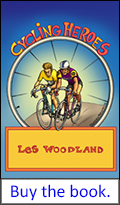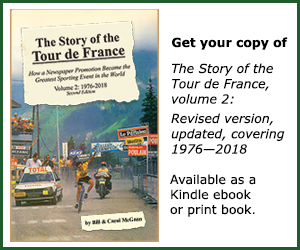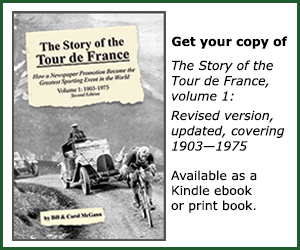

Jacques Anquetil - Party Boy
By Owen Mulholland
Owen Mulholland's second story on Jacques Anquetil is posted here.

Les Woodland's book Cycling Heroes: The Golden Age is available as an audiobook here. For the print and Kindle eBook versions, just click on the Amazon link on the right.
Owen Mulholland writes:
For much of his illustrious career Jacques Anquetil maintained an aloof public persona. Of course that's a natural pose or self-defense for anyone who is so at the mercy of his fans.
But even Anquetil's style of riding seemed to confirm the observation that cool disdain replaced blood in his veins.
His absolute dominance of races he wished to win made even his most bitter rivals cringe with respect. The way he could always do just enough to win gave an entire generation of cyclists a complex.

Jacques Anquetil winning stage 13 of the 1963 Tour de France
Yet there was a lighter side to "le Normand". Particularly on the down side of the season, after he'd won yet another Tour de France (five in all), he could give in to a little lapse of discipline. In fact, those who knew him were well aware of Jacques' weakness for parties, card playing, and drinking. For the average rider such indulgences would have been deadly, but then Anquetil was no average rider.
Take the eve of the Ronde d' Auvergne in August, 1963. It's one of the numerous circuit races local organizers put on around France for the local folks to get a close-up look at the stars. Not all these races are "balls to the wall"-sometimes a local rider might be allowed to win-but such gestures take place at a very high level. One look at the average speed of these events will demonstrate that.
Earlier that day Jacques had won the Grand Prix de Felletin. As soon as gracefully possible, he, his wife Janine, team director Raphael Geminiani, and several other riders bid adieu to their hosts, jumped in their cars and blasted the 250 kms. to Clermont-Ferrand, site of the next day's race.
They arrived at the hotel at 11 p.m. and immediately descended on the restaurant where a dinner of spaghetti, chops, cheese, and dessert awaited them. To celebrate the day's victory Geminiani ordered a bottle of champagne, then another, and another. A local rugby star who had joined them, not wishing his sport to appear less magnanimous, matched Geminiani's largesse. Pierre Chany, the famous French cycling journalist, ordered two more.
On the stroke of midnight the "peleton à table" saw its first "abandonés". Two Belgians from the Solo team, Van Looy and Sorgeloos, slipped off to their beds, warning all who cared to hear, "Careful, the race starts at 8:30 in the morning."
The party continued unabated. At 2 a.m. Anquetil claimed he was still hungry. He inhaled a plate of eggs and asked for a whiskey to wash it down, then a second whiskey to wash down the first!
At 3 a.m. he phoned Marcel Bidot, the man in charge of selecting the French team for the forthcoming World Championships. "Marcel," Jacques began after the groggy Bidot had finally picked up his phone," excuse me for waking you at this hour, but I have something important to tell you. I have decided to race the next World Championship in order to win it. But there are some things I wish to discuss with you before making any public announcement. Do you think you could come here to Clermont-Ferrand so we could discuss these matters after the race later today?" Bidot, believing the whole affair to be critical for French success, replied with enthusiasm. "Of course, I'll be out the door and in my car just as soon as I get my clothes on." Bidot knew it would be a six or seven hour drive.
Anquetil finally slipped between the sheets at 5 a.m. Just two hours later Gem was knocking at his door. "Leave me in peace!" the now subdued Anquetil cried.
"Hey, what're you going to tell old man Bidot when he's at the race and you aren't?"
A groan, followed by the shuffle of slippered feet told Raphael that his party boy had bowed to the inevitable.
With puffy eyes and breath strong enough to be ignited, Jacques wearily joined the peleton at the start line. After a few kilometers he had a flat. Just the excuse he needed. As Geminiani leapt from the car with a spare, Jacques headed for the car, muttering something about going back to the hotel.
"To the hotel?!" Gem exploded. "What kind of fool are you? Look at the sky. It's beautiful. It's a perfect day to go hard and sweat out the toxins. Listen to me, you can do well today." Once again Jacques knew his director was right, however loathe he was to admit it. A new wheel in place, Jacques was underway again and soon regained the peleton. The "Ronde d' Auvergne" is known to have one of the toughest circuits of the after-Tour season. It's profile looks like the teeth of a saw. With 70 kms. to go, only ten riders remained in the race. Attack followed attack over the last hour, and one by one the riders cracked and were left behind. Finally, with two kms. remaining, Anquetil went into overdrive, left the few survivors gasping, and cruised under the "arrivée" banner for a popular win.
After the usual ceremony, Geminiani expected a word of thanks. But Jacques said nothing. Patience was never one of Gem's most notable attributes. "Well? Don't you have anything to say to me?"
"Sure." replied Jacques nonchalantly. "Put the champagne on ice."
That night Jacques slept in the back of his car as his wife drove to the distant town of Quillan where again Jacques triumphed.
After the race, Tom Simpson (the famous British rider who was to die in the 1967 Tour de France.) confided to Pierre Chany, "I don't know what Anquetil has been eating lately, but I've never seen him so strong!"









